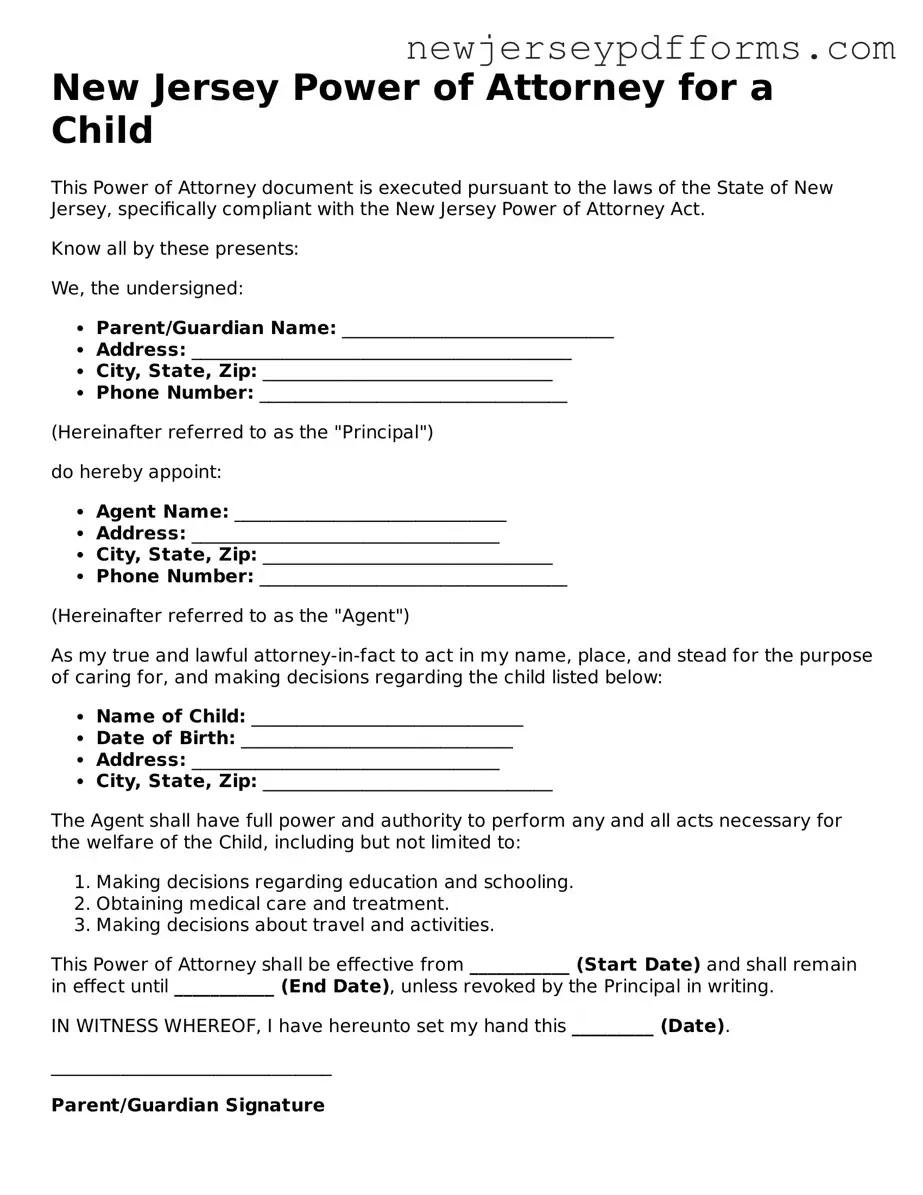The New Jersey Power of Attorney for a Child form is similar to a standard Power of Attorney (POA) document. Both forms allow one person to grant authority to another to make decisions on their behalf. In the case of a standard POA, the scope of authority can cover financial, legal, or medical matters. However, the Power of Attorney for a Child specifically focuses on decisions regarding the care and welfare of a minor, emphasizing the child's best interests.
Another document that shares similarities is the Medical Power of Attorney. This form allows an individual to designate someone to make medical decisions for them if they become unable to do so. Like the Power of Attorney for a Child, it grants specific authority to another person, but it is focused solely on healthcare decisions rather than broader caregiving responsibilities.
The Guardianship form is also comparable. A Guardianship establishes a legal relationship where one person is appointed to care for another, often a minor or an incapacitated adult. While both documents provide authority to make decisions, Guardianship typically involves a court process and is more permanent, whereas the Power of Attorney for a Child can be temporary and does not require court approval.
Similar to the Power of Attorney for a Child is the Child Custody Agreement. This document outlines the rights and responsibilities of parents or guardians regarding a child's care and living arrangements. While the Power of Attorney allows someone to act on behalf of a parent temporarily, a custody agreement defines long-term arrangements and legal rights concerning the child's upbringing.
Understanding the various documents available for child care can help streamline the process of ensuring a child's well-being. For example, individuals may find themselves needing to fill out a Rental Application form, which is crucial for landlords to assess potential tenants. The significance of accurately completing such forms extends beyond housing; for those interested in templates, a reliable resource is the PDF Document Service, which offers a user-friendly approach to creating necessary paperwork for multiple scenarios, including those involving minors.
The Authorization for Release of Medical Records form also shares some similarities. This document allows a parent or guardian to give permission for medical providers to share a child's health information with designated individuals. Both forms emphasize the importance of consent and decision-making regarding a child’s welfare, although the focus of the Authorization is on medical information rather than caregiving authority.
The Child Care Agreement is another document that resembles the Power of Attorney for a Child. This agreement is typically used between parents and caregivers to outline the terms of care for a child. It details responsibilities and expectations, similar to how the Power of Attorney specifies the authority granted to a designated individual for the child’s care.
Another related document is the Temporary Custody Agreement. This is often used when parents need to delegate temporary care of their child to someone else. Like the Power of Attorney for a Child, it allows for a designated caregiver to make decisions on behalf of the child, but it is typically more informal and may not require legal formalities.
The Release of Liability Waiver for Child Activities form is also similar. This document allows parents to release liability for certain activities their child participates in. While it does not grant authority to make decisions, it involves parental consent for activities, much like the Power of Attorney for a Child involves consent for caregiving decisions.
The Consent for Treatment form is another document that aligns with the Power of Attorney for a Child. This form allows parents or guardians to authorize medical treatment for their child. Both documents empower someone to make decisions regarding a child’s health, but the Consent for Treatment is specifically focused on medical care.
Finally, the Affidavit of Parentage can be compared to the Power of Attorney for a Child. This document establishes the legal relationship between a parent and child. While the Power of Attorney grants authority for decision-making, the Affidavit of Parentage affirms legal rights and responsibilities, ensuring that the child’s interests are protected.

